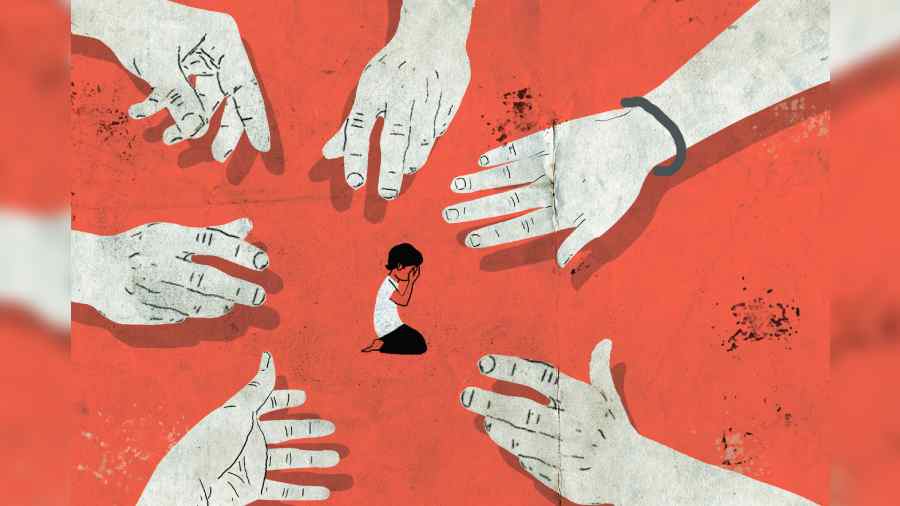Twenty-five years ago, a father, a senior executive in a corporate firm, was forced to leave his job when he found to his dismay that a group of teenagers was throwing stones at Debmalya and asking him to dance on a stage constructed for Durga Puja. Debmalya was warned that if he stopped dancing, he would be stoned.
The boy was also abused sexually by this particular group of teenagers and his family members failed to understand what the ideal reaction pattern for them as caregivers could be. They felt ashamed and preferred to keep tightlipped about the incident.
The boy, being a specially-abled person, often displayed inappropriate behaviour. His parents were usually ashamed of his clumsiness. The parents even started thinking that the boy was partly responsible for all these unfortunate incidents as he was not like other children of his age. They had the feeling that “it is OK” for children of his age to be curious about him as it was their son who would plead with them to play and interact with him when they tried to ignore him. The victim is to blame is often the general trend.
The incident of throwing stones at the boy made his father ask for voluntary retirement from his job and take full responsibility of his son. Parents often feel hopeless as it is not always feasible for every parent to take such a decision.
It is not uncommon for people with special needs to face abuse or bullying. It is no more a stray incident. It happened 25 years ago and it is happening now, even though maybe a number of NGOs are trying in their own capacity to raise awareness to prevent or stop abuse.
Abuse and bullying often happen in closed-door environments. It might happen at home, in school, college, office or under any circumstances.
What is abuse?
Abuse is a form of violence that involves harming, hurting or mistreating someone physically, emotionally, mentally, sexually, or financially. Abuse can happen to anyone, regardless of age, gender, race, religion, or ability. Some people are more vulnerable to abuse, like homemakers, the elderly or people with special needs.
Frequent incidents of abuse and their effects are visible in not only children or people with special needs, but also among college-goers, in some offices and at homes where the silent sufferers are homemakers.
Psychological abuse can include mind-game manipulation and control of someone’s money, time, vehicle or contact with friends as a way of asserting power over them.
It is often seen that parents of specially-abled persons withdraw themselves from social dos to avoid uneasy or embarrassing questions and remarks from relatives and so-called well-wishers. They withdraw into a shell and their world centres around only their affected child.
Physical abuse is visible while psychological abuse is not and so it is unnoticed. Psychological and emotional abuse doesn’t leave cuts and bruises and broken bones. But the unseen, emotional damage can be as great and the effects are long-lasting. Psychological abuse can be caused by repeated putdowns and name-calling, intimidation and harassment that make victims feel bad about themselves. It often leads to depression, nervous breakdown or even suicide.
Psychological abuse can be in many forms:
- Making people feel the fault lies in them
- Constant criticism or comparing
- Humiliating in front of others
- Trying to intimidate or scare someone
- Creating an environment where a person feels isolated and alone
- Constant laming
- Making a person feel scared of what might happen next
- Sexual abuse is also common and specially-abled people often face it. Sexual abuse includes:
- Forcing them to have sex or touch sexual parts
- Touching a person in a way that they don’t like
- Forcing specially-abled people to watch porn
A specially-abled person needs love, care, support and attention. Their caregivers also need some hope and a reliable community to look forward to.
Incidents like the one recently — where a 22-year-old autistic man was harassed, humiliated and finally assaulted allegedly by a group of teenagers because he had refused to dance for them in public — shatter not only the confidence of the affected individual, but also hurt the caregivers. Awareness programmes in collaboration with media, police and NGOs could probably lead to a more secure society.
What to do
- As a parent or caregiver, it is natural to feel shocked and numb about an incident. However, it is important to be calm to support and reassure the victim
- Make the child comfortable to share their feelings
- Caregivers also need some emotional support and help and should move forward to avail of those opportunities
- Show trust in what they say
- Show your support
- Take professional help if needed as often specially-abled persons fail to disclose all their feelings in front of their parents
What not to do
- Don’t be angry at the child if she fails to share the incident with you properly. Give her some time and understand its impact on their minds
- Don’t always force them to talk about the same incident day in and day out.
- Don’t negate their feelings
After-effects of abuse
- Stress and anxiety: Abuse can lead to anxiety, chronic stress, societal anxiety or post-traumatic stress disorder. Often, it can also lead to a nervous breakdown in the victim.
- Frustration and depression: The victim, when unable to combat the daily exploitation, may feel frustrated, hopeless and even depressed.
- Blow to self-image: The self-image of the person might turn negative. She might feel that she is incapable and that is the reason behind theabuse.
- Self-blame and guilty feeling: The victim who does not get support from his family or friends thinks that she is responsible for his misfortune. It leads to the feeling that her incapability was triggering the abuser to inflict harm on him/her.
Author is a psychologist and founder-director of Turning Point, a mental rehabilitation organisation.






